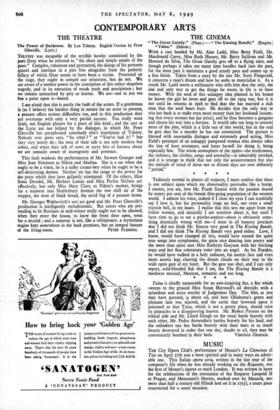THE CINEMA
" The Great Gatsby." (Plaza.)—" The Kissing Bandit." (Empire.; "Tulsa." (Odeon.)
Wrrx a cast headed by Mr. Alan Ladd, Miss Betty Field, Mr. Macdonald Carey, Miss Ruth Hussey, Mr. Barry Sullivan and Mr. Howard da Silva, The Great Gatsby gets off to a flying start, and though perhaps it takes too many time hurdles back into the past, for the most part it maintains a good steady pace and comes up to a fine finish. Taken from a story by the late Mr. Scott Fitzgerald, it concerns a man's dream and how he seeks to materialise it. As a youth Mr. Ladd meets a millionaire who tells him that the only, the one and only way to get the things he wants in life is to have money. With the seed of this unhappy idea planted in his breast he leaves the girl he loves and goes off to the 1914 war, but it is not until he returns in 1918 to find that she has married a rich man that the seed bears fruit. He decides that the only way to win her back is to make even more money than her husband (assum- ing that every woman has her price), and he thus becomes a gangster and shoots his way into a fortune. It would take too long to unravel more of the plot, which is a little out of this world, but in the end he gets shot for a murder he has not committed. The picture is blessed with reasonable dialogue and extremely good acting, Miss Field's portrayal of an unhappy pampered woman who always takes the line of least resistance, and hates herself for doing it, being especially fine. The whole atmosphere of the I9205—the restlessness, the richness, the clothes, songs and amorality—is admirably invoked, and it is strange to think that not only the accoutrements but also the attitude of mind of those not so distant days are now definitely " period."
Tediously normal in almost all respects, I must confess that there is one subject upon which my abnormality protrudes like a hump. I cannot, you see, love Mr. Frank Sinatra with the passion shared by ninety per cent of the female film-going population of the western world. I admire his voice, indeed if I close my eyes I can truthfully say I love it, but his personality rings no bell, not even a small tricycle bell, in my heart. I realise that this sets me apart from my fellow women, and naturally I am sensitive about it, but until I have time to go to see a psycho-analyst—there is obviously some- thing drastically wrong with me—I must in all honesty proclaim that I did not think Mr. Sinatra very good in The Kissing Bandit, and I did not think The Kissing Bandit very good either. Love, I know, would have changed all this, would have turned the quite nice songs into symphonies, the quite nice dancing into poetry and the more than quite nice Miss Kathryn Grayson with her fetching ways and her fine coloratura voice into an angel. As for Frankie, he would have walked in a holy radiance, his ascetic face and even more ascetic legs cleaving the dream clouds on their way to the wide open gate of my heart. But the gate was shut, and I can only report, cold-blooded fish that I am, the The Kissing Bandit is a mediocre musical, Mexican, romantic and too long.
* * * *
Tulsa is chiefly memorable for an awe-inspiring fire, a fire which sweeps to the ground Miss Susan Hayward's oil derricks with a splendour and noise worthy of Judgement Day. The film, as you may have guessed, is about oil, and how Oklahoma's green and pleasant face was scarred, and the cattle that browsed upon it poisoned so that Tulsa, which is not a pretty place, should raise its pinnacles to a disapproving heaven. Mr. Robert Preston on the ethical side and Mr. Lloyd Gough on the venal battle bravely with each other, Mr. Pedro Armendariz battles bravely for his land, and the onlookers can but battle bravely with their tears at so much beauty destroyed in order that one day, thanks to oil, they may be






































 Previous page
Previous page